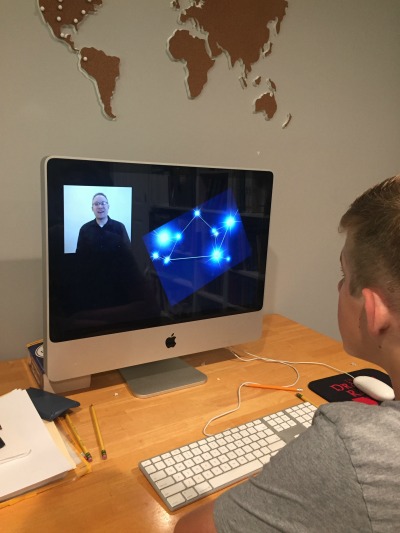How do you approach music appreciation in your homeschool?
So often music gets pushed to the sides in our homeschools, and this is such a shame, because it nurtures a part of our children that is deep and meaningful. It speaks directly to their hearts and inspires beautiful thoughts and quiet contemplation.
Do you have a background and feel comfortable teaching this -- or do you feel woefully inept and therefore sometimes avoid it (even though you are aware of its value)?
As with so many areas of homeschooling, I believe we're educating OURSELVES - especially when it comes to areas where we don't possess knowledge.
(My favorite book for music self education is Raising Musical Kids. This books teaches parents how to teach their children to LOVE music and also how to motivate your children to develop their own musical abilities - it's definitely worth finding a copy and keeping on hand for reference.)
I love the words of Jim Henson:
“Music is an essential part of everything we do. Like puppetry, music has an abstract quality which speaks to a worldwide audience in a wonderful way that nourishes the soul.”
Martin Luther, ever the master of directness, said this about music:
"I always loved music; who so has skill in this art is of good temperament, fitted for all things."
Today I'd like to talk about how to go about beginning the study of music appreciation in your home.
First, a crash course on the basics:
The Eras of Music
There are 4 basic eras of music (more if you count early music before the 1600s). For our intents and purposes we begin music appreciation in the 1600s.
(For a detailed description on these periods you can read The History of Classical Music.
Baroque : 1600-1750
Classical: 1750-1830
Romantic: 1830-1920
Modern: 1920- Present
Using The Eras of Music to Guide Music Appreciation Studies
I believe there are two logical ways to approach the study of music appreciation:
1. Study the era of music that coincides with the era you are studying in history.
If you are studying the Renaissance, a survey of Baroque music would be appropriate. If you are studying the Revolutionary War era, then a study of Classical music would be in order.
OR
2. Study an era of music in depth, exposing your children to the great composers of that era.
This era can be chosen at random or based on a special interest in your home. For example, last year in our homeschool we took a trip to the Oregon Trail. I wanted my children to learn about modern music and how that music was a direct reflection of the adventurous spirit of that time.
Know the Composers and their Famous Works
As you decide on an era to study, research some of the composers that were prominent during that era and their most famous pieces.
There are many sites online that will help you with this. I also love the book Classical Music: The 50 Greatest Composers and their 1,000 Greatest Works.
{It's always bothered me that we refer to all "old" music as "Classical" - because this isn't really correct, is it? You now know that music is divided into eras and "Classical" is one of those eras, but many people refer to classical music in general terms.}
Listen, Listen, Listen!
Whatever you do, just LISTEN to beautiful music. Even if nothing else than pulling up a "Classical" station on Pandora, it's still valuable.
Make time to incorporate a little great music each day. Maybe you want to accompany one meal a day with music or maybe you want to play music at bedtime. Choose a time of day and stick with it!
Dig Deeper and Start Teaching Music Appreciation
In my years as a classroom music teacher and now in my time as a homeschooling mom, I have found enormous value in listening to a piece and then talking about the musical elements of that piece.
Just like we read a classic novel and analyze the elements of that work, we must do the same thing with great pieces of music.
To that end, I have put my heart into my music appreciation curriculum -- SQUILT -- or Super Quiet UnInterrupted Listening Time
The SQUILT Curriculum
This course is designed for parents who have LITTLE OR NO MUSICAL KNOWLEDGE.
Of course, if you have musical knowledge, that's fine, too!
Through listening to a piece once SUPER QUIET, and then listening again and recording observations about the elements of the music, our children learn to be better listeners. The SQUILT curriculum provides you, the teacher, with the "script" for taking a child through a piece of music. The answers are all there.
You can print the listening notebooking sheets and reference sheets that help your child learn the "grammar" of music appreciation.
(image courtesy The Unplugged Family)
Everything is in one convenient PDF file - no need to purchase music.
Simply OPEN AND GO.
I also provide supplemental resources to make music FUN -- cartoons and classical music, different performances of a piece of music, and interesting facts about composers and instruments. It's all designed to keep your child engaged and learning.
The SQUILT Curriculum includes many different option to make music appreciation simple and easy in your homeschool:
Eras series --- 4 different volumes focusing on Baroque, Classical, Romantic & Modern Music
Composer Spotlights -- shorter volumes focusing on specific composers
Meet the Instruments -- a printable instrument flashcard and accompanying video resource to make learning instruments of the orchestra fun
If you'd like to give SQUILT a try, you may try a sample of both SQUILT and SQUILT Live!
Do you teach music appreciation in your homeschool?
If you don't, do you mind sharing WHY? I'd love to know!








